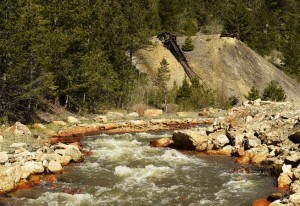Anglers received welcome news as the EPA announced it will be repealing the rollback of Clean Water Act protection for ephemeral streams from the previous administration. States including Colorado had challenged the legality of the rollback, and by returning to the Bush-era rule the EPA will restore protection for the feeder streams whose health drives downstream conditions in larger rivers as well. Read TU’s statement below:
EPA to repeal 2020 rule and move to reinstate Clean Water Act protections for small streams
Contacts:
Chris Wood, president and CEO, Trout Unlimited, chris.wood@tu.org
Steve Moyer, vice president for government affairs, Trout Unlimited, steve.moyer@tu.org
ARLINGTON, Va.—Trout Unlimited welcomes today’s announcement from the U.S. Environmental Protection Agency that the “Waters of the United States” rule promulgated by the previous administration is illegal and must be redrawn. In moving to repeal and revise the rule, the EPA is listening to the many states, businesses, and conservation groups, like TU, that are working to reinstate federal Clean Water Act protections for the nation’s waters and wetlands.
Trout Unlimited opposed the 2020 Navigable Waters Protection Rule because it dropped decades-long protections nationwide for “ephemeral” streams, which flow only after rainfall. The 2020 rule made it easier to pollute and degrade these streams, which provide drinking water, flood protection, outdoor recreation opportunities, and fish habitat.
“These small headwaters constitute more than half the nation’s stream miles, and are the capillaries of the nation’s aquatic systems,” said Chris Wood, president and CEO of Trout Unlimited. “They provide seasonal habitat for fish and wildlife, and protect water quality downstream. The 2020 rule left streams and fisheries across the country unprotected. We applaud EPA Administrator Regan for taking action to safeguard clean water.”
EPA assessments of more than 1,500 streams in the Southwest determined that they were no longer covered by the Clean Water Act under the 2020 rule. Around the country, some 333 projects that would have required dredge-and-fill permits went ahead without them after the rule took effect.
Regan said the EPA is committed to a meaningful stakeholder engagement process that leads to a more durable “Waters of the U.S.” replacement rule, one that is both scientifically and legally sound, and garners broader stakeholder support. TU will bring to that process deep and longstanding relationships with farmers, ranchers, and foresters, and we will make sure that these partners’ voices are heard and considered by the EPA.
“We believe that through meaningful stakeholder engagement, the EPA will be able to craft a more durable ‘Waters of the U.S.’ rule that will continue to provide a solid foundation for the Clean Water Act, and maintain protection of our valuable streams and wetlands,” said Steve Moyer, vice president for government affairs at Trout Unlimited.
With today’s announcement, the agencies will now initiate a repeal of the 2020 rule, after which protections for streams and wetlands would revert to 2008 guidance until a new rule is finalized. That guidance, put in place by the Bush administration EPA, protected most ephemeral streams and many additional wetlands.
###
Trout Unlimited is the nation’s oldest and largest coldwater fisheries conservation organization dedicated to caring for and recovering America’s rivers and streams, so our children can experience the joy of wild and native trout and salmon. Across the country, TU brings to bear local, regional, and national grassroots organizing, durable partnerships, science-backed policy muscle, and legal firepower on behalf of trout and salmon fisheries, healthy waters and vibrant communities.















